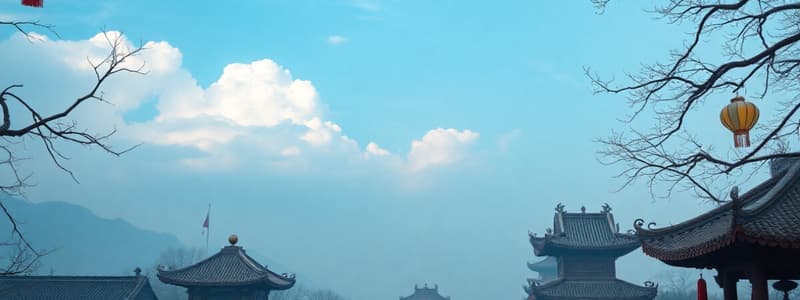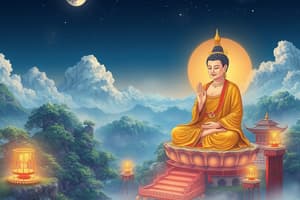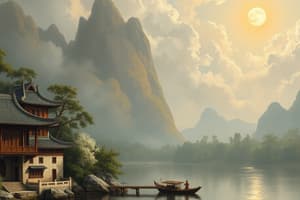Podcast
Questions and Answers
Which color is typically associated with emperors in Chinese fashion?
Which color is typically associated with emperors in Chinese fashion?
- Yellow (correct)
- Blue
- Green
- Purple
What term refers to traditional Han Chinese clothing before the Qing Dynasty?
What term refers to traditional Han Chinese clothing before the Qing Dynasty?
- Qipao
- Cheongsam
- Hanfu (correct)
- Mandarin
Which of the following is NOT one of the Five Classics of Chinese literature?
Which of the following is NOT one of the Five Classics of Chinese literature?
- The Book of Changes
- The Classic of Rites
- The Tale of Genji (correct)
- The Classic of History
Which philosophical work emphasizes 'inclusive love' as an ethical principle?
Which philosophical work emphasizes 'inclusive love' as an ethical principle?
Which feature is emphasized in Chinese architecture to convey grandeur?
Which feature is emphasized in Chinese architecture to convey grandeur?
What cultural aspect heavily influences the naming of a child in Chinese tradition?
What cultural aspect heavily influences the naming of a child in Chinese tradition?
Which of the following is included in the Four Books?
Which of the following is included in the Four Books?
Which architectural principle is important in the development of Chinese buildings?
Which architectural principle is important in the development of Chinese buildings?
What was a significant principle espoused by Confucius regarding interpersonal relationships?
What was a significant principle espoused by Confucius regarding interpersonal relationships?
Which of the following best describes Sun Yat-sen’s political philosophy?
Which of the following best describes Sun Yat-sen’s political philosophy?
What role did Chiang Kai-Shek play in the Republic of China?
What role did Chiang Kai-Shek play in the Republic of China?
Which statement accurately represents Mao Zedong's influence in Chinese history?
Which statement accurately represents Mao Zedong's influence in Chinese history?
What was the historical significance of the Spratly Islands in the context of China’s territorial claims?
What was the historical significance of the Spratly Islands in the context of China’s territorial claims?
What concept did Confucius recommend as the foundation for ideal government?
What concept did Confucius recommend as the foundation for ideal government?
Who is recognized as the 'forerunner of democratic revolution' in the context of Chinese history?
Who is recognized as the 'forerunner of democratic revolution' in the context of Chinese history?
What was the role of the National Military Council during Chiang Kai-Shek's leadership?
What was the role of the National Military Council during Chiang Kai-Shek's leadership?
What is the principle of reciprocity as stated by Confucius?
What is the principle of reciprocity as stated by Confucius?
According to Confucius, what is essential for a man's character to be established?
According to Confucius, what is essential for a man's character to be established?
Which statement best reflects Confucius' view on righteousness?
Which statement best reflects Confucius' view on righteousness?
What does Confucius suggest about a man's ability to conduct himself respectfully?
What does Confucius suggest about a man's ability to conduct himself respectfully?
What attitude towards faults does Confucius advocate?
What attitude towards faults does Confucius advocate?
How does Confucius view virtue?
How does Confucius view virtue?
Which quality does Confucius identify as a trait of a superior man?
Which quality does Confucius identify as a trait of a superior man?
What does Confucius suggest about riches and honors acquired through unrighteousness?
What does Confucius suggest about riches and honors acquired through unrighteousness?
What ingredient is notably used in Sichuan cuisine to contribute to its bold flavors?
What ingredient is notably used in Sichuan cuisine to contribute to its bold flavors?
Which cuisine places a greater emphasis on local herbs and vegetables rather than seafood?
Which cuisine places a greater emphasis on local herbs and vegetables rather than seafood?
What is the main objective in the game of Jian zi?
What is the main objective in the game of Jian zi?
What type of beliefs predominantly guided people in pre-modern China concerning death?
What type of beliefs predominantly guided people in pre-modern China concerning death?
What tradition emphasized personal cultivation for achieving an ideal life and afterlife salvation?
What tradition emphasized personal cultivation for achieving an ideal life and afterlife salvation?
Which game is popularly known as the 'gate game' among elderly Chinese?
Which game is popularly known as the 'gate game' among elderly Chinese?
Which of the following statements best describes a common practice among those embracing new religions in China?
Which of the following statements best describes a common practice among those embracing new religions in China?
What is the primary objective of the game San Mao?
What is the primary objective of the game San Mao?
What prompted Chen Ma to allow Fu Chee to live in a nearby cave?
What prompted Chen Ma to allow Fu Chee to live in a nearby cave?
Which behavior exemplifies Fu Chee's affection for Chen Ma?
Which behavior exemplifies Fu Chee's affection for Chen Ma?
What was the nature of Fu Chee's guarding behavior after Chen Ma's death?
What was the nature of Fu Chee's guarding behavior after Chen Ma's death?
What cultural significance is illustrated by the stone monument erected by the hunters?
What cultural significance is illustrated by the stone monument erected by the hunters?
How did Fu Chee's actions affect the perception of tigers among the hunters?
How did Fu Chee's actions affect the perception of tigers among the hunters?
What is the primary theme conveyed through Fu Chee's loyalty to Chen Ma?
What is the primary theme conveyed through Fu Chee's loyalty to Chen Ma?
Which literary aspect is present in the tale of Fu Chee and Chen Ma?
Which literary aspect is present in the tale of Fu Chee and Chen Ma?
How did Fu Chee's story become a household legend?
How did Fu Chee's story become a household legend?
What is implied about the First Lady's past in the park?
What is implied about the First Lady's past in the park?
What role does nature play in Tu Fu's poetry according to the content?
What role does nature play in Tu Fu's poetry according to the content?
What does the phrase 'tainted with blood-pollution' suggest about the Lady's current state?
What does the phrase 'tainted with blood-pollution' suggest about the Lady's current state?
Which event significantly impacted the Lady's emotions in the passage?
Which event significantly impacted the Lady's emotions in the passage?
How does the imagery in the lines about nature convey a sense of fleeting beauty?
How does the imagery in the lines about nature convey a sense of fleeting beauty?
What sentiment is expressed about communication between the departed and the living?
What sentiment is expressed about communication between the departed and the living?
What does the presence of foreign horsemen symbolize in the city?
What does the presence of foreign horsemen symbolize in the city?
What is one of the conventions seen in both Chinese poetry and Japanese haiku regarding nature?
What is one of the conventions seen in both Chinese poetry and Japanese haiku regarding nature?
Flashcards
Spratly Islands claim
Spratly Islands claim
Both the People's Republic of China (PRC) and the Republic of China (ROC) claim ownership of the entire Spratly Islands.
Zengmu Ansha
Zengmu Ansha
The southernmost extent of the China's claim in the Spratly Islands, bordering Malaysia.
Confucius
Confucius
A Chinese philosopher and teacher who authored/edited Chinese classics, promoting family values and the Golden Rule.
Sun-Yat-Sen
Sun-Yat-Sen
Signup and view all the flashcards
Chiang Kai-Shek
Chiang Kai-Shek
Signup and view all the flashcards
Mao Zedong
Mao Zedong
Signup and view all the flashcards
Three Principles of the People
Three Principles of the People
Signup and view all the flashcards
Chinese Revolution
Chinese Revolution
Signup and view all the flashcards
Chinese Fashion Trends
Chinese Fashion Trends
Signup and view all the flashcards
Hanfu
Hanfu
Signup and view all the flashcards
Chinese Architecture
Chinese Architecture
Signup and view all the flashcards
Hundred Schools of Thought
Hundred Schools of Thought
Signup and view all the flashcards
Five Classics
Five Classics
Signup and view all the flashcards
Four Books
Four Books
Signup and view all the flashcards
Eight Characters of Chinese Astrology
Eight Characters of Chinese Astrology
Signup and view all the flashcards
Bad Luck Naming a Baby
Bad Luck Naming a Baby
Signup and view all the flashcards
Sichuan Cuisine
Sichuan Cuisine
Signup and view all the flashcards
Anhui Cuisine
Anhui Cuisine
Signup and view all the flashcards
San Mao
San Mao
Signup and view all the flashcards
Shuttlecock
Shuttlecock
Signup and view all the flashcards
Ti Jian Xi
Ti Jian Xi
Signup and view all the flashcards
Pre-modern China beliefs
Pre-modern China beliefs
Signup and view all the flashcards
Chinese Popular Religion
Chinese Popular Religion
Signup and view all the flashcards
Individual Salvation
Individual Salvation
Signup and view all the flashcards
Golden Rule
Golden Rule
Signup and view all the flashcards
Reciprocity
Reciprocity
Signup and view all the flashcards
Superior Man
Superior Man
Signup and view all the flashcards
Right Living
Right Living
Signup and view all the flashcards
Righteousness
Righteousness
Signup and view all the flashcards
Propriety
Propriety
Signup and view all the flashcards
Sincerity
Sincerity
Signup and view all the flashcards
Happiness in Simple Living
Happiness in Simple Living
Signup and view all the flashcards
Chen Ma's Character
Chen Ma's Character
Signup and view all the flashcards
Fu Chee's Loyalty
Fu Chee's Loyalty
Signup and view all the flashcards
Allegorical Tale?
Allegorical Tale?
Signup and view all the flashcards
Traditional Chinese Family Values
Traditional Chinese Family Values
Signup and view all the flashcards
Chen Ma's Sacrifice
Chen Ma's Sacrifice
Signup and view all the flashcards
Fu Chee's Behavior
Fu Chee's Behavior
Signup and view all the flashcards
Literary Reflection Question 2
Literary Reflection Question 2
Signup and view all the flashcards
Fu Chee as an Epitome
Fu Chee as an Epitome
Signup and view all the flashcards
Tu Fu's Poetry
Tu Fu's Poetry
Signup and view all the flashcards
Tu Fu's Excellence
Tu Fu's Excellence
Signup and view all the flashcards
Nature in Chinese Poetry
Nature in Chinese Poetry
Signup and view all the flashcards
Poem's Imagery
Poem's Imagery
Signup and view all the flashcards
Japanese Haiku & Chinese Poems
Japanese Haiku & Chinese Poems
Signup and view all the flashcards
Michelle Obama's quote
Michelle Obama's quote
Signup and view all the flashcards
Waging War
Waging War
Signup and view all the flashcards
The First Lady
The First Lady
Signup and view all the flashcards
Study Notes
Introduction to Chinese History, Cultures, Traditions, and Beliefs
- China is located in East Asia, the third largest country in the world, with a land area of 9,561,000 square kilometers and over 1.2 billion people.
- It is geographically divided into two regions: Outer (Western) China and Inner (Eastern) China.
- Inner China, including China Proper and Manchuria, is densely populated.
- Beijing is the capital and second largest city (after Shanghai). It has hot, humid summers and cold, dry winters.
- China is home to various dynasties, internal struggles, and political transformations. Communism is one major political transformation.
- Confucianism, Taoism, Buddhism, Christianity, and Islam are the main religions.
- The Great Wall of China, over 2,400 km long, was built in the 3rd century BCE to protect from invaders. It is considered one of the Seven Wonders of the World.
- China has diverse forest types, ranging from cold coniferous forests in the north, supporting moose and black bears, to subtropical forests in the center and south.
- China became a communist state in 1949.
- The Cultural Revolution, designed by Mao Tse-tung in the 1960's, aimed to replace the existing power structure with a more revolutionary one.
- The People's Republic of China (PRC) and the Republic of China (ROC) both claim the Spratly Islands in the South China Sea, with the southernmost claim reaching Zengmu Ansha (James Shoal).
Famous People
- Confucius was a Chinese teacher, editor, politician, and philosopher from the Spring and Autumn Period. He authored or edited the Five Classics and his teachings are found in the Analects. Confucius championed strong family values.
- Sun Yat-sen was a Chinese revolutionary, first president, and founding father of the Republic of China. His primary contribution is the Three Principles of the People, which consist of nationalism, democracy, and the people's livelihood.
- Chiang Kai-shek was a political and military leader of China in the 20th century, leading the Northern Expedition and becoming chairman of the Nationalist government.
- Mao Zedong, also known as Mao Tse-Tung, was a Chinese Communist revolutionary, guerrilla strategist, Marxist political philosopher, architect, and founding father of the People's Republic of China.
Historical Places
- Badaling Great Wall: The most visited section of the Great Wall.
- The Forbidden City: The Chinese Imperial Palace, home to emperors, and a World Heritage Site (largest collection of preserved ancient wooden structures).
- The Temple of Heaven: China's largest complex of ancient sacrificial buildings.
- Yungang Grottoes: Buddhist cave art with over 51,000 statues.
Significant Events
- The Tripartite Confrontation of the Three Kingdoms: A period in Chinese history between 220-265 CE, with conflict between the Wei, Shu, and Wu states.
- The Xi'an Incident: A significant historical episode during the Chinese Civil War.
Culture
- Chinese culture is highly influenced by Confucianism and conservative philosophies.
- Important components include: literature, music, visual arts, martial arts, cuisine, fashion, architecture, and leisure.
- Chinese classic texts include: concepts of poetry, astrology, astronomy, calendar, divination, constellations etc.
- Chinese art encompasses fine arts, folk art, and performance art (porcelain pottery, painting).
Music, Art, and Fashion
- Youlan or the Solitary Orchid, is one of Confucius's oldest written music pieces.
- Chinese orchestras contain bowed strings, woodwinds, plucked strings, and percussion.
- Chinese art encompasses aspects of fine art, folk art, and performance art (porcelain pottery, painting).
- Martial Arts, are often called Kung Fu or Wushu ("martial arts" or "military arts").
- In Chinese fashion the color yellow or red is often reserved for the emperor.
Architecture
- Chinese architecture emphasizes width, exhibiting grandeur in halls and symmetry.
- Feng shui plays an important role in structural development.
Literature
- Chinese literature has roots in the Hundred Schools of Thought in the Eastern Zhou Dynasty.
Traditions
- Naming a baby before birth is considered bad luck in Chinese culture.
- Chinese babies' date and time of birth are determined by Eight characters of Chinese Astrology, that influence the entire life.
- Families in Chinese culture are generally tight knit, living under one roof.
Chinese Marriage and Wedding Traditions
- Traditional Chinese marriages involved pre-arrangements between families.
- Romantic love was, however, allowed.
Chinese Food
- Famous Chinese cuisines include Cantonese, Shandong, Jiangsu, and Sichuan.
- Techniques such as braising and stewing are frequently used.
- Regional delicacies like Peiking Roast Duck and Hairy Crab are well-known.
Recreation
- San Mao (three feathers): a game using three feathered shuttlecocks and wooden paddles.
- Jian zi is a gate game similar to hacky sack.
- Ti Jian Xi is a hacky sack like game where players kick a large shuttlecock around a circle
Beliefs
- Pre-modern China had beliefs about death and practices, influencing popular religion.
- Religions like Buddhism, Confucianism, Taoism and others influenced Chinese beliefs and practices.
Government
- Reverent attention to business, sincerity, economy in expenditure, love for others, and employment of the people in seasons are key government principles.
- A well-governed country values poverty and mean conditions, while riches and honor are valued in poorly run countries.
- The Art of governing is about keeping affairs before the mind tirelessly, and practicing without deviation.
Education
- Learning without thought is labor lost; thought without learning is dangerous.
- Important stages of life were marked by events like when a person was 15, 30, 40, 50, or 70 yrs old.
Studying That Suits You
Use AI to generate personalized quizzes and flashcards to suit your learning preferences.




